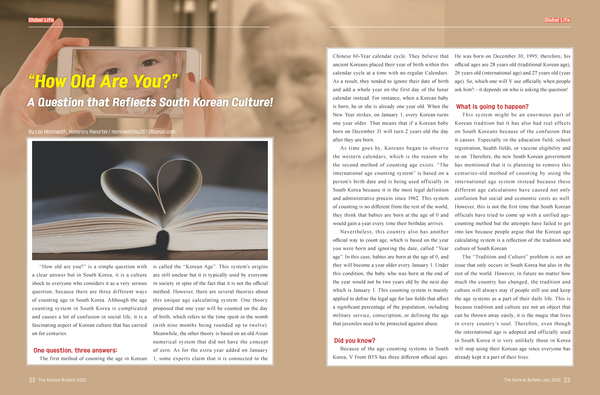A Question that Reflects South Korean Culture!

“How old are you?” is a simple question with a clear answer but in South Korea, it is a culture shock to everyone who considers it as a very serious question, because there are three different ways of counting age in South Korea. Although the age counting system in South Korea is complicated and causes a lot of confusion in social life; it is a fascinating aspect of Korean culture that has carried
on for centuries.
One question, three answers:
The first method of counting the age in Korean is called the “Korean Age”. This system’s origins are still unclear but it is typically used by everyone in society in spite of the fact that it is not the official method. However, there are several theories about this unique age calculating system. One theory proposed that one year will be counted on the day of birth, which refers to the time spent in the womb (with nine months being rounded up to twelve). Meanwhile, the other theory is based on an old Asian numerical system that did not have the concept of zero. As for the extra year added on January 1, some experts claim that it is connected to the Chinese 60-Year calendar cycle. They believe that ancient Koreans placed their year of birth within this calendar cycle at a time with no regular Calendars.
As a result, they tended to ignore their date of birth and add a whole year on the first day of the lunar calendar instead. For instance, when a Korean baby is born, he or she is already one year old. When the New Year strikes, on January 1, every Korean turns one year older. That means that if a Korean baby born on December 31 will turn 2 years old the day after they are born.
As time goes by, Koreans began to observe the western calendars, which is the reason why the second method of counting age exists. “The international age counting system” is based on a person’s birth date and is being used officially in South Korea because it is the most legal definition and administrative process since 1962. This system of counting is no different from the rest of the world, they think that babies are born at the age of 0 and would gain a year every time their birthday arrives.
Nevertheless, this country also has another official way to count age, which is based on the year you were born and ignoring the date, called “Year age”. In this case, babies are born at the age of 0, and they will become a year older every January 1. Under this condition, the baby who was born at the end of the year would not be two years old by the next day which is January 1. This counting system is mainly applied to define the legal age for law fields that affect a significant percentage of the population, including military service, conscription, or defining the age that juveniles need to be protected against abuse.
Did you know?
Because of the age counting systems in South Korea, V From BTS has three different official ages. He was born on December 30, 1995; therefore, his official ages are 28 years old (traditional Korean age), 26 years old (international age) and 27 years old (year age). So, which one will V use officially when people ask him?—it depends on who is asking the question!
What is going to happen?
This system might be an enormous part of Korean tradition but it has also had real effects on South Koreans because of the confusion that it causes. Especially in the education field, school registration, health fields, or vaccine eligibility and so on. Therefore, the new South Korean government has mentioned that it is planning to remove this centuries-old method of counting by using the international age system instead because these different age calculations have caused not only confusion but social and economic costs as well. However, this is not the first time that South Korean officials have tried to come up with a unified agecounting method but the attempts have failed to get into law because people argue that the Korean age calculating system is a reflection of the tradition and culture of South Korean.
The “Tradition and Culture” problem is not an issue that only occurs in South Korea but also in the rest of the world. However, in future no matter how much the country has changed, the tradition and culture will always stay if people still use and keep the age systems as a part of their daily life. This is because tradition and culture are not an object that can be thrown away easily, it is the magic that lives in every country’s soul. Therefore, even though the international age is adopted and officially used in South Korea it is very unlikely those in Korea will stop using their Korean age since everyone has already kept it a part of their lives.

